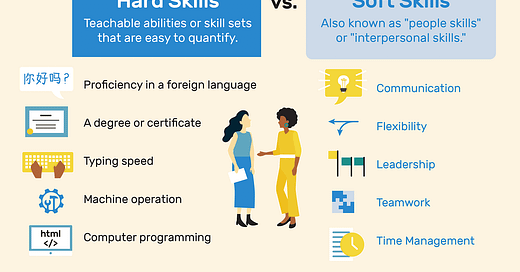Hard and Soft Skills
Hard skills are the measurable outcomes that are easy to identify, test, and track across time.
Soft skills include collaboration, the ability to regulate your emotions, and flexibility in problem-solving.
Here is a good example of what happened to the US school system. We went for easily measurable results, rather than taking a more open approach. On top of that, hard skills are the goal of nearly every parent. Every parent wants validation that they’re doing a good job. Soft skills don’t provide the immediate validation of hard skills.
Despite being called soft, these skills are much more predictive of future success. So what skills fall under this category?
adaptability
autonomy
communication
creativity
cultural sensitivity
empathy
higher-order thinking
integrity
planfulness
positive attitude
professionalism
resilience
self-control
self-motivation
social skills
teamwork skills
responsibility
leadership
learning to learn skills
persuasiveness
organization
initiative
character
goal orientation
Wow… Despite that long list, the authors end by saying, “and so forth.” Clearly, these soft skills play a big part in our ability to make choices about our life. Imagine if we tested for these rather than how we currently test children?
With all the prestige that comes with Ivy League admission, parents get rabid about prepping their kids. The parents appear to be packaging and branding their children for these schools. They’re focused on stuffing facts into their products… I mean, children… instead of building character.
Honestly though, who can blame them? Parents are busier than ever! Most families cannot afford to have a spouse stay home. With such busy lives, it is no wonder most parents focus on easily measurable results. Settling for hard skills over soft.
For more clarity on the benefits of soft skilled, the authors quote from the book Drive by Daniel Pink.
Carrot and stick kind of motivations - giving money or material rewards - worked successfully in the 20th century but often produced the opposite of the results it was intended to achieve.
Instead of trying to motivate people from the outside with rewards, Pink argued that the ability to learn and create new things and to improve our world is the motivation that really matters. That comes from the inside!
Having a direct impact on your world. That is true motivation. Being one of many cogs in a machine is demoralizing. Worse, actually. It’s dehumanizing.
And how does the US stack up currently?
Only 24% of current 4-year college graduates were rated as excellent in the skills needed for success in today’s world.
Yeesh… That’s pretty ugly.
As this realization has taken hold, a new industry has begun to grow. In 2009 a new term, 21st-century skills, was coined. By 2015, searching this term brought more than 72,600,000 Google results.
With such an explosion in interest, the child-rearing industry has taken notice. For that reason, be wary of any marketers hitting you with buzz words. Their terms may not exactly mirror “21st Century skills” but they become obvious when looking for them.
This brings us back to what is really important. The authors remind us of the most important question… “What kind of person do I want my child to be?”
It’s not about getting our kid into a prestigious college. Or about prepping them for any other specific outcome. It is about them as a human being. Who do we want them to be? No marketer can tell us that. But if we don’t know, then we may just believe a marketer when they come selling solutions. Is their solution right for us? How can we know if we’re focused on the wrong things?
Here are two more quotes that suggest where our focus should be…
Hard skills are the foundation of a successful career. But soft skills are the cement. These skills are not traits nor are they to be achieved once and checked off a list. They focus on the learner, rather than the teacher or parent.
Kindergarten students who were socially competent and did things such as sharing, cooperating, or helping other kids were most likely to attain higher education and well-paying jobs than those who were less socially competent. Neither race nor gender mattered.



